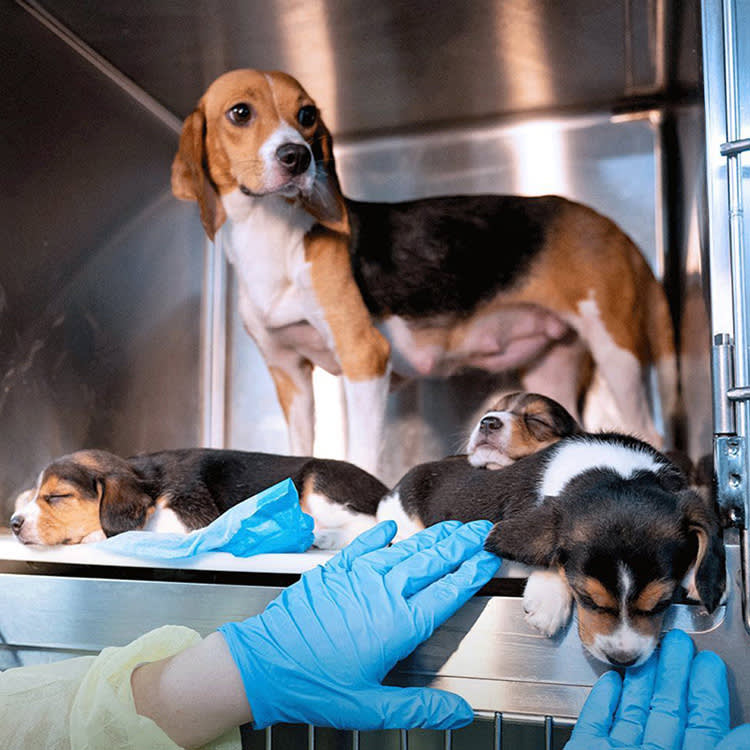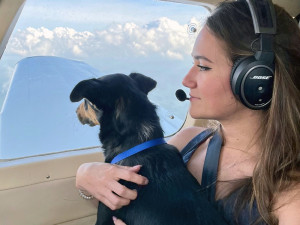4,000 Beagles Rescued From a Research Facility Need Homes
It’s one paw in front of the other for these dogs as they adjust to life in safe homes.

Share Article
Caleb and Armando stand on the concrete slab that extends out from the garage. They look at the lawn. The fresh green grass is compelling, but there is something about the way it smells. It’s like nothing they’ve smelled before. They look at each other and back at the yard as the sun beats down on their russet coats, a common hue of many beagles’ tri-color markings. Finally, one tentatively puts his paw into the grass and steps forward. It is the first time either dog has touched grass.
These two are among the 4,000 beagles in the process of being removed from the Envigo breeding site in Cumberland, Virginia by the Humane Society of the United States (HSUS), following an investigationopens in new tab by the U.S. Department of Agriculture (USDA). As The New York Times reportedopens in new tab, multiple investigations found the company violated federal policies regarding the treatment of the animals that left dogs underfed, sick, and wounded — and in the worst cases, dead.
How the Beagles were finally rescued
“The Department of Agriculture has alleged some pretty significant Animal Welfare Act opens in new tab violations,” Lindsay Hamrick, the director of shelter outreach and engagement for the Humaine Society, tells Kinship. “They noted things like 25 puppies who died of cold exposure at the facility in the past, maggots that were in dog food, and animals with medical conditions that should have received treatment [but did not].”
After a federal judge approved a plan for the 4,000 dogs to be rescued, the department began working with the HSUS on a 60-day plan to remove them from the Cumberland, Virginia, facility and find homes for all of them. The HSUS has employed a network of rescue organizationsopens in new tab around the country as the first stop for many of the beagles to be spayed or neutered and checked for further health issues.

As of mid-August, half the dogs had been removed. Caleb and Armando ended up under the care of the Virginia Coalition for Beagle Protection opens in new tab(VCBP), a coalition of national and Virginia-based animal protection organizations under PETA. And from there, they found themselves in the Norfolk, Virginia yard of their foster mom and PETA employee, Cindy Kent, having a lot of firsts.
“Everything is brand new. Eating from a bowl was brand new,” Kent tells Kinship of the beagles’ experiences. “While the average puppy born into the world is used to sounds like a lawn mower or car or coming home [and] turning on the television — it’s brand new for these pups.”
Kent remembers Calen and Armando’s first time hearing birds and how they ducked in the yard as the birds flew overhead, not realizing how far away they were. She will also never forget their first time on leashes, in her backyard; they were not ready for walks yet. Caleb was adopted after a few weeks, so Kent signed up for another foster, and now she has Roxy.
Armando, who is still with Kent, is having a more difficult time adjusting. He barks in the middle of the night if anyone gets up, unsure of noises and what may be happening. Kent shares a photo of his ear tattooed with his ID number. All the Envigo beagles have them — those were their names until now.
A long road to recovery
Until the USDA intervened, these beagles were bound for testing facilities. They were kept in large kennels with concrete floors on which they went to the restroom and fed from communal troughs. There was no quiet, no dog beds, no personal space, and certainly no toys.
“The same reason that so many people are interested in helping to give these beagles a home is the reason that companies like Envigo use them,” Hamrick says. “They're generally very social and unlikely to bite the people performing these horrible tests on them.”
A report from CNNopens in new tab says that Envigo’s parent company, Inotiv Inc., announced in June that it would close this facility. In July, it settled with the government and did not pay any finesopens in new tab. Bill Stanley, a Republican state senator for Virginia, said that efforts to close Envigo began well before this incident.
“I tried to shut them down in 2019 but was not successful,” Stanley said at the timeopens in new tab. “But over the years, we never stopped fighting.”
Glenn Youngkin, the governor of Virginia, signed five billsopens in new tab in April that will strengthen protections for dogs under the care of companies who breed them to sell and at animal testing facilities.
“It’s always so surprising when animals are pulled from a situation that is really horrifying and are still capable of being social with people,” Hamrick says. “And certainly, many of these dogs are timid because they’ve been living in a kennel their entire lives. They have no sense or socialization of the world around them.”
One paw in front of the other
That rang true for Tricia Rossman, a foster with Priceless Pets opens in new tab in Chino Hills, California. Her foster from the group of 4,000, a 6-year-old beagle named Goldie, is one of the older dogs rescued from the facility. “I strategically wanted the oldest one because I figured she's been in that facility for the longest,” Rossman says. ��“She was just kind of sitting there politely wagging her tail and definitely uncertain what’s going on, but you could tell that she wanted to be loved.”
She describes doing simple things, like setting Goldie down on the grass on their lawn or helping her onto the couch, as experiences that would frighten the dog at first. Having a covered crate for her safe spot and exposure to their household noises helped.
“One of the one of the things that she did, which I thought was just like the sweetest thing is, she would eat her kibble laying down,” Rossman says. “I bet she’d never had that privilege in the past.”
How to help
If you are interested in fostering or adopting one of these beagles or donating to the shelters who are caring for them, please check out the HSUS’s list of sheltersopens in new tab to find one near you.

Courtney E. Smith
Courtney is a freelance writer and podcaster whose work has appeared in Esquire, Pitchfork, Eater, and more. Her prior work includes working as an editor and music critic for Refinery29 and CBS Radio. And she's the author of the essay collection Record Collecting for Girls. She lives in Dallas, Texas with her rescue dog, Casey, where they volunteer together with the SPCA’s foster program.
Related articles
![A woman holding a French bulldog over her shoulder.]()
Bulldogs and Other Flat-Faced Breeds Are Being Banned. Here’s Why
Breeds with those squished-in faces are charming — but their health issues are not.
![A brunette woman holding a black dog with a blue collar, she is wearing headphones and a microphone attachment while seated in a plane with the clouds and sky showing through the window]()
Pilots to the Rescue Has Flown Nearly 400 Animals to Safety This Year
With the help of flight, this nonprofit is saving animals and relocating them to loving homes across the country.


